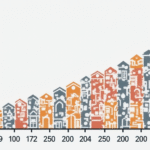Introduction and Background on Jorge Esteve, CNA President
Jorge Esteve, the president of the Consejo Nacional Agropecuario (CNA), has highlighted that Mexico’s security issues are driving up food prices by 10% to 20%. As the head of the national agricultural sector, Esteve’s insights carry significant weight in understanding the challenges facing Mexico’s food industry.
Impact of Insecurity on Food Prices
Esteve explained during the Fourth International Agri-Food Congress in Guadalajara that the current security situation in Mexico is leading to increased costs for farmers and consumers alike. These heightened expenses stem from the necessity of implementing safety measures such as hiring security personnel, installing barriers, and equipping vehicles with tracking systems. Additionally, rising insurance costs and frequent thefts further exacerbate the problem.
Financial Challenges for Small and Medium Enterprises (SMEs)
Another pressing issue, according to Esteve, is the lack of accessible financing for small and medium-sized enterprises (SMEs) in the agricultural sector. He pointed out that the dismantling of the Financial National Development (FND) has left less than 10% of producers with access to credit, and even when credit is available, it often lacks competitiveness compared to Mexico’s northern neighbors, the United States and Canada.
Prioritizing Food Safety Amid Geopolitical Uncertainty
Esteve emphasized that in the current geopolitical climate and trade uncertainty, diversifying markets for Mexican food products is crucial. However, he stressed that ensuring food safety and quality must be a top priority to achieve this goal.
Concerns Over Reduced Funding for Food Safety Agencies
Esteve raised concerns about the proposed budget cuts for the Servicio Nacional de Sanidad, Inocuidad y Calidad Agroalimentaria (Senasica) in the federal government’s 2026 budget. He argued that reduced funding for food safety agencies would ultimately harm Mexican producers, as it would lead to increased costs and lower-quality products.
Jalisco’s Position as Mexico’s Agri-Food Powerhouse
Lorena Delgado, president of the Consejo de Desarrollo Agropecuario y Agroindustrial de Jalisco (CDAAJ), acknowledged the challenges facing Mexico’s agricultural sector but emphasized that Jalisco remains the country’s agri-food powerhouse due to unity, innovation, and sustainability.
Importance of Imported Timber for Mexico’s Wood Industry
Gerardo Huerta, president of the Cámara Nacional de la Industria Maderera (Canaima) de Occidente, warned against imposing tariffs on imported timber from Asia. Huerta explained that Mexico only produces 27% of the wood it needs, relying heavily on imports from the United States, Brazil, and Chile. Moreover, valuable timbers like oak, walnut, and maple are entirely imported since Mexico does not produce them domestically.
Potential Consequences of Tariffs on Imported Timber
Huerta cautioned that imposing tariffs on imported timber would have devastating effects on Mexico’s wood industry, as it would limit access to essential materials like palets and packaging. These restrictions could hinder the growth and competitiveness of Mexican wood manufacturers.
Key Questions and Answers
- What is causing the rise in food prices in Mexico? Insecurity in the country is leading to increased costs for farmers, including hiring security personnel, installing barriers, and equipping vehicles with tracking systems. Rising insurance costs and frequent thefts also contribute to higher food prices.
- What financial challenges does the agricultural sector face in Mexico? Small and medium-sized enterprises (SMEs) struggle to access affordable credit, with less than 10% of producers currently having access to any form of credit. Available credit often lacks competitiveness compared to northern neighbors like the United States and Canada.
- Why is food safety crucial for Mexican agricultural exports? Ensuring food safety and quality is essential to diversify markets for Mexican food products amid geopolitical uncertainty and trade challenges.
- What are the concerns regarding proposed budget cuts for food safety agencies in Mexico? Reduced funding for food safety agencies like Senasica could lead to increased costs and lower-quality products for Mexican producers.
- Why are tariffs on imported timber a concern for Mexico’s wood industry? Mexico relies heavily on imported timber, with only 27% of its wood needs met domestically. Tariffs on imported timber could limit access to essential materials like palets and packaging, hindering the growth and competitiveness of Mexican wood manufacturers.






